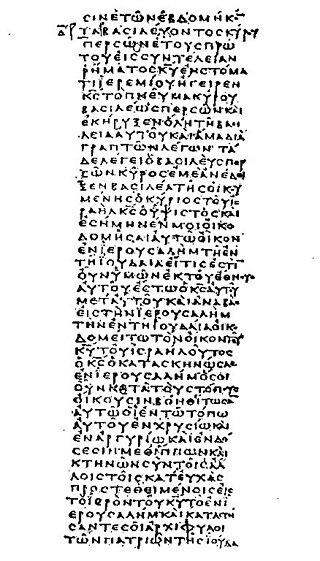
The Septuagint, sometimes referred to as the Greek Old Testament or The Translation of the Seventy, and often abbreviated as LXX, is the earliest extant Greek translation of the Hebrew Bible from the original Hebrew. The full Greek title derives from the story recorded in the Letter of Aristeas to Philocrates that "the laws of the Jews" were translated into the Greek language at the request of Ptolemy II Philadelphus by seventy-two Hebrew translators—six from each of the Twelve Tribes of Israel.

The Talmud is the central text of Rabbinic Judaism and the primary source of Jewish religious law (halakha) and Jewish theology. Until the advent of modernity, in nearly all Jewish communities, the Talmud was the centerpiece of Jewish cultural life and was foundational to "all Jewish thought and aspirations", serving also as "the guide for the daily life" of Jews.

Bruno Bauer was a German philosopher and theologian. As a student of G. W. F. Hegel, Bauer was a radical Rationalist in philosophy, politics and Biblical criticism. Bauer investigated the sources of the New Testament and, beginning with Hegel's Hellenophile orientation, concluded that early Christianity owed more to ancient Greek philosophy (Stoicism) than to Judaism.
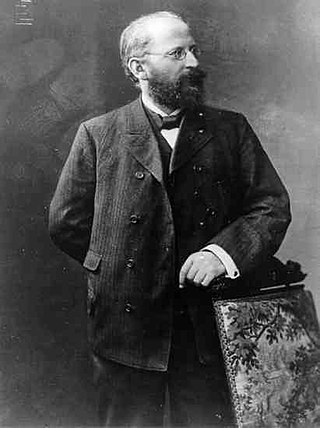
Eduard Bernstein was a German social democratic Marxist theorist and politician. A member of the Social Democratic Party of Germany (SPD), Bernstein had held close association to Karl Marx and Friedrich Engels, but he began to identify what he believed to be errors in Marxist thinking and began to criticize views held by Marxism when he investigated and challenged the Marxist materialist theory of history. He rejected significant parts of Marxist theory that were based upon Hegelian metaphysics and rejected the Hegelian perspective of an immanent economic necessity to socialism.

Christian communism is a theological view that the teachings of Jesus compel Christians to support religious communism. Although there is no universal agreement on the exact dates when communistic ideas and practices in Christianity began, many Christian communists argue that evidence from the Bible suggests that the first Christians, including the Apostles in the New Testament, established their own small communist society in the years following Jesus' death and resurrection. Many advocates of Christian communism and other communists, including Karl Kautsky, argue that it was taught by Jesus and practised by the apostles themselves. This is generally confirmed by historians.
The Apostolic Fathers, also known as the Ante-Nicene Fathers, were core Christian theologians among the Church Fathers who lived in the 1st and 2nd centuries AD who are believed to have personally known some of the Twelve Apostles or to have been significantly influenced by them. Their writings, though widely circulated in early Christianity, were not included in the canon of the New Testament. Many of the writings derive from the same time period and geographical location as other works of early Christian literature which came to be part of the New Testament.

The Jewish War or Judean War, also referred to in English as The Wars of the Jews, is a book written by Josephus, a first-century Roman-Jewish historian. It has been described by Steve Mason as "perhaps the most influential non-biblical text of Western history".
Religious socialism is a type of socialism based on religious values. Members of several major religions have found that their beliefs about human society fit with socialist principles and ideas. As a result, religious socialist movements have developed within these religions. Those movements include Buddhist socialism, Christian socialism, Islamic socialism, and Jewish socialism. According to the Encyclopedia Britannica Online, socialism is a "social and economic doctrine that calls for public rather than private ownership or control of property and natural resources. According to the socialist view, individuals do not live or work in isolation but live in cooperation with one another. Furthermore, everything that people produce is in some sense a social product, and everyone who contributes to the production of a good is entitled to a share in it. Society as a whole, therefore, should own or at least control property for the benefit of all its members. [...] Early Christian communities also practiced the sharing of goods and labour, a simple form of socialism subsequently followed in certain forms of monasticism. Several monastic orders continue these practices today".
"On the Jewish Question" is a response by Karl Marx to then-current debates over the Jewish question. Marx wrote the piece in 1843, and it was first published in Paris in 1844 under the German title "Zur Judenfrage" in the Deutsch–Französische Jahrbücher.
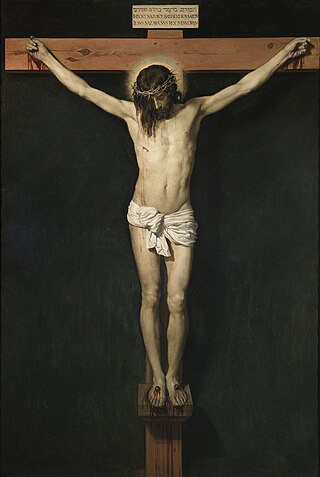
Criticism of Jesus has existed since the first century. Jesus was criticised by the Pharisees and scribes for disobeying Mosaic Law. He was decried in Judaism as a failed Jewish messiah claimant and a false prophet by most Jewish denominations. Judaism also considers the worship of any person a form of idolatry, and rejects the claim that Jesus was divine. Some psychiatrists, religious scholars and writers explain that Jesus' family, followers and contemporaries seriously regarded him as delusional, possessed by demons, or insane.

Wilhelm Bousset was a German theologian and New Testament scholar. He was of Huguenot ancestry and a native of Lübeck. His most influential work was Kyrios Christos, an attempt to explain the origins of devotion to Christ as the product of second century Hellenistic forces, and is still the most widely influential academic work on early Christology, even if its conclusions are not supported by modern scholarship.
The Augsburg Confession, also known as the Augustan Confession or the Augustana from its Latin name, Confessio Augustana, is the primary confession of faith of the Lutheran Church and one of the most important documents of the Protestant Reformation. The Augsburg Confession was written in both German and Latin and was presented by a number of German rulers and free-cities at the Diet of Augsburg on 25 June 1530.
Against the Galileans, meaning Christians, was a Greek polemical essay written by the Roman emperor Julian, commonly known as Julian the Apostate, during his short reign (361–363). Despite having been originally written in Greek, it is better known under its Latin name, probably due to its extensive reference in the polemical response Contra Julianum by Cyril of Alexandria.
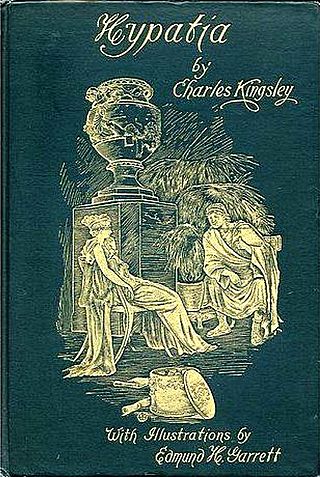
Hypatia, or New Foes with an Old Face is an 1853 novel by the English writer Charles Kingsley. It is a fictionalised account of the life of the philosopher Hypatia, and tells the story of a young monk called Philammon who travels to Alexandria, where he becomes mixed up in the political and religious battles of the day. Intended as Christian apologia, it reflects typical 19th-century religious sentiments of the day. For many years the book was considered one of Kingsley's best novels and was widely read.
Religious communism is a form of communism that incorporates religious principles. Scholars have used the term to describe a variety of social or religious movements throughout history that have favored the common ownership of property.
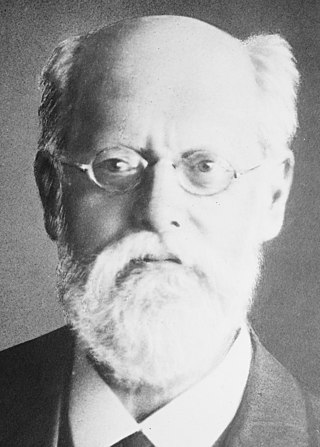
Karl Johann Kautsky was a Czech-Austrian philosopher, journalist, and Marxist theorist. A leading theorist of the Social Democratic Party of Germany (SPD) and the Second International, Kautsky advocated orthodox Marxism, which emphasized the scientific, materialist, and determinist character of Karl Marx's work. This interpretation dominated European Marxism for two decades, from the death of Friedrich Engels in 1895 to the outbreak of World War I in 1914.

Forerunners of Modern Socialism is a four volume work that documents the history of primitive communist and socialist ideas, edited by Karl Kautsky and including contributions by a number of prominent intellectuals of the Second International, including Eduard Bernstein, Paul Lafargue, C. Hugo, Franz Mehring, and Georgii Plekhanov. The first volume was published in 1895.
Caesar's Messiah is a 2005 book by Joseph Atwill that argues that the New Testament Gospels were written by a group of individuals connected to the Flavian family of Roman emperors: Vespasian, Titus and Domitian. The authors were mainly Flavius Josephus, Berenice, and Tiberius Julius Alexander, with contributions from Pliny the Elder. Although Vespasian and Titus had defeated Jewish nationalist Zealots in the First Jewish–Roman War of 70 AD, the emperors wanted to control the spread of Judaism and moderate its political virulence and continuing militancy against Rome. Christianity, a pacifist and pro-Roman authority religion, was their solution.

The Class Struggle (Erfurt Program) (German: Das Erfurter Programm in seinem grundsätzlichen Theil erläutert von Karl Kautsky) is an 1892 book-length work by Karl Kautsky. It was first published in Stuttgart and was the official commentary of the Social Democratic Party of Germany (SPD) on their brief 1891 Erfurt Program (by Kautsky, party leader August Bebel and Eduard Bernstein). It became and is still considered the seminal (and popular) text for Orthodox Marxism and the Second International.
Wuchan zhe yesu zhuan (無產者耶穌傅), translated into English as Jesus the Proletarian, is a Chinese historical novel based on the life of Jesus. It was written by biblical scholar Zhu Weizhi and published in 1950.












